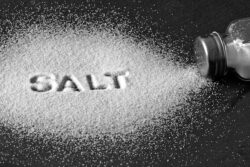The American diet is atrocious and largely responsible for the growing epidemics of diabetes, cardiovascular disease, and obesity, not just in America, but worldwide. The highly processed, high calorie, high fructose corn syrup and hydrogenated fat, and high chemical additive products that line grocery stores are products of American ingenuity; products that we have exported internationally, and sadly, products that are responsible for the declining metabolic health worldwide. This is a fact that many of us are reticent to accept. We are poisoning ourselves and everyone else around us by the products we make and consume.
A recent study found that fully 80% of metabolic disease can be attributed to lifestyle, e.g. poor diet and a lack exercise. Eighty percent. That is a staggering finding especially when one considers that 476 million people worldwide have diabetes, most of them Type 2 (T2). This represents a 129% increase since 1990, when the number stood 211.2 million. During the same time frame, the rates of cardiovascular disease have increased from 271 million to 523 million. Underlying a significant percentage of these conditions is the obesity epidemic, with 13% of the world’s population considered obese and 39% considered overweight and heading towards obesity.
In the US, the situation is quite dire, only 12-20% of the population, depending upon the criteria utilized, are considered metabolically healthy. Clearly, our approach to metabolic health is not working and yet, much of the focus in health research remains centered on either identifying that one medication or combination of medications that resolve all of our bad choices or an overly simplistic approach to health represented by balancing the calories in/calories out equation. As evidenced by the exploding numbers of metabolic disease, neither of these perspectives seems particularly useful.
While both personal choice and calories play a role in these epidemics, the problem is much broader. The food ecosystem has been decimated and in its place, we have non-nutritive chemical-toxicant food-like products that were designed to be highly addictive. When consumed, these products fundamentally change the metabolism of the individual who consumes them, and not for the better. Every bite of a chemically processed food is one step closer to metabolic disease. Beyond that however, the choice to allow industry to create, utilize, and ultimately dump these chemicals into food, other products, and into the environment, rests on us as well. Those are choices too; choices that affect the metabolic health of communities, and more broadly, the world.
We tend to think of industry and the pollution they create as amorphous, self-propelling and promoting agents of doom, forgetting of course, that each and every one of these organizations is made of people; people like you and me who make decisions to produce and promote these chemical poisons; people who choose to put poisons in foods under the auspices of the pathetically weak and ineffective GRAS guidelines. People make these choices. We do not get forever chemicals that fundamentally disrupt all aspects of metabolism without people who chose to create them, others who chose to use them in common products (and deny any and all risk), and all of us who relish in the novelty of these products. We do not get 80,000 synthetic chemical entities currently on the market without people putting them there. We do not get 1.8 billion pounds of glyphosate used every year, enough for every person on the planet to consume 4lbs annually without people that made choices to produce, use, and not regulate this chemical. We are the problem. We made these choices. We are the ones who are destroying our health and the health of others by the choices we make.
So when we look at the skyrocketing numbers of diabetes, cardiovascular disease, and obesity, it is not enough to say ‘eat better and eat less’. We need to clean house, top to bottom. We need to stop producing the garbage food that pollutes our bodies and the environment. We need to take responsibility for all of the choices that lead us to the point where only 12-20% of the population can be considered metabolically healthy.
We Need Your Help
More people than ever are reading Hormones Matter, a testament to the need for independent voices in health and medicine. We are not funded and accept limited advertising. Unlike many health sites, we don’t force you to purchase a subscription. We believe health information should be open to all. If you read Hormones Matter, like it, please help support it. Contribute now.
Yes, I would like to support Hormones Matter.
Photo by Ishaq Robin on Unsplash.
















Dr’s. Lonsdale & Marrs,
First, thank you so much for your long-needed knowledge and the “why” for so many maladies. I have read your book-which is an invaluable wealth of info-so much so I am reading it for a 2nd time, and surmise I will be many times more.
I have been on a hunt for the “cause” of the A-fib my husband first experienced 15 years ago, (notably, after a stressful incident), he was also hypotensive & SOB (BP 60/40), hence off to the ER (overnight observation) & years later put on Metoprolol (to reduce heart rate). Fast forward to 2017 when we switched from an HMO to Stanford Health care, where he had a Maze Procedure (hybrid ablation) which put him in normal sinus rhythm for 2 years, then his symptoms worsened to include the following: Afib, PVC’s, tachycardia (203 BPM, possibly POTS), neuropathy both feet, restless leg syndrome, undiagnosed Apnea, insomnia & gross abnormalities found on a Transthoracic Echo (5/28/21) summary: the left & right atrium are severely dilated with mild regurgitation of mitral, tricuspid & aortic valves.
Since reading your book we’ve eliminated most if not all sugar (except fruit), eat mostly organic, protein 2 times a day, snack on nuts, unsweetened yogurt, fruit, no alcohol (for my husband for years), myself for 2 months, no smoking.
Now to today’s treatment, thankfully due to you and your book(!) he is taking 300mg of Lipothiamine/per day with Magnesium taurate, B-complex, Multi-vit, plus a litany of other supplements. I started him on 50mg/per day & titrated up 50 mg every 10-14 days to the current 300 mg dose. I am happy to report he is having less episodes of tachycardia, Afib & the neuropathy “pins & needles” of both feet.
Additional history: he had a Zio patch cardiac monitor (last month for 1 week) ordered by his electrophysiologist which resulted in the recommendation of Metoprolol, which we are declining, as it will interfere with the Thiamine protocol. His docs know & seem to be onboard.
My question is, should we continue with the current 300 mg dose or continue to titrate up? Is there a protocol for when to take this amount of thiamine? We are taking 100 mg three times a day. Should we take Mag taurate, B, Multi-vit with each dose, or is once a day OK for these?
Last, if I might suggest there be a place on HM’s site for a list of Docs (who have read & understand Thiamine Deficiency Disease, Dysautonomia, and High Calorie Malnutrition), or functional med docs or PA’s that administer IV Thiamine, etc…to help us navigate, rather than doing it all by the seat of our pants?
with Gratitude, Midge
I would love to know the diets of Dr. Marrs and Dr. Lonsdale and Elliott Overton as well. I’ve purchased and read both Thiamine Deficiency Disease, Dysautonomia, and High Calorie Malnutrition, along with A Nutritional Approach to a Revised Model for Medicine. After unknowingly consuming large amounts of high oxalate foods for most of my life, I could use some guidance on what to eat and drink. Carnivore was a disaster for me, but so many people seem to thrive on it. Is there a book you would suggest? Had a consult with an oxalate expert, but was thrown off by the large amount of carbs that were recommended, upwards of 75 grams a day.
I guess I would describe my diet as paleo -ish. I eat mostly meats, fish, vegetables, fruits when in season, full fat, unsweetened Greek yogurt, nuts, eggs, grains occasionally, but not very often. I don’t drink or smoke. Haven’t taken a medication in over a decade. Up until last year, my only food/drink vice was one cup of black coffee per day. I have since removed that, not necessarily by choice, but after covid, the caffeine really seems to throw my body for a loop. My diet is probably high in oxalate based upon the vegetables and nuts, but I believe so long as thiamine and other micronutrients are sufficient, oxalates can be degraded effectively in most folks. I wrote about it a while back. https://www.hormonesmatter.com/marginally-insufficient-thiamine-intake-oxalates/
My diet is not perfect, but relatively healthy compared to many.
Oh, and to the extent possible, organic.
The problem is that we read about it all the time, but no one truly understands how true and important diet actually is. Everybody keeps eating junk even if they have ailments and pain and symptoms, because they can’t imagine how changing diet would be benefitting them. “It’s just food!” we all thend to think and “what cures us is modern medicine(s)”.
A very wise doctor from the past century observes what people eat (and how they treat their bodies in general) and then writes that it’s not astounding that people do get sick and fall ill, but rather it’s astounding that some people don’t get sick/ill. Getting sick from food like that is the norm for him and not getting sick (with that type of food) is an exception in his opinion.
Reading his words made all the difference to me. If I keep eating junk and not get sick from it, I would be the exception. One just has to expect to get sick from it and that’s that.
If you look at it like that and you do get sick and get symptoms (and everyone does) then stopping the junk food should be the first thing on the list.
We seem to believe that posting GRAS rules takes us off the hook of responsibility. I tried reading them and found them insufferably boring. I fear that human recognition of an impending health disaster comes into the same category as global warming–few will notice!